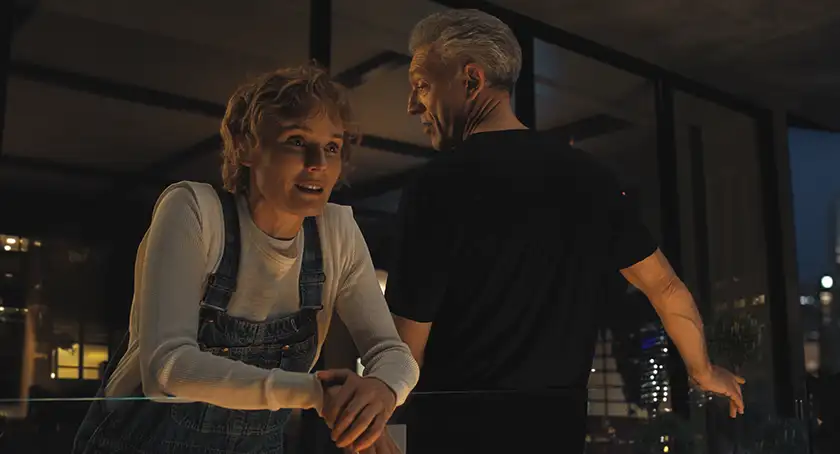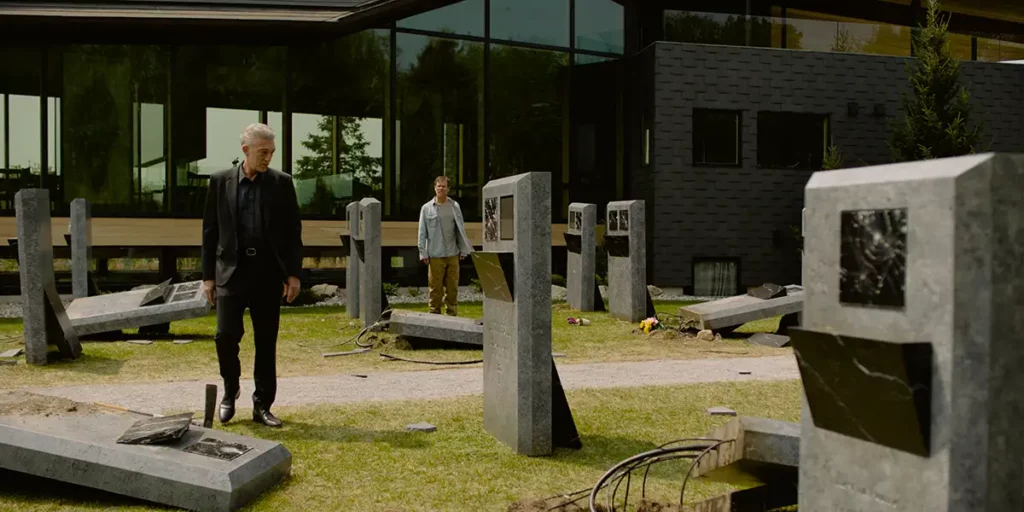Even if the plotting could be tighter, the ideas at work in The Shrouds mark it as Cronenberg’s most personal feature.
Director: David Cronenberg
Genre: Horror, Sci-Fi
Run Time: 119′
Cannes Premiere: May 20, 2024
U.S. Release: April 18-25, 2025
U.K. & Ireland Release: August 11, 2025
Where to Watch: On Digital & VOD
The older auteurs returning to the 77th edition of the Cannes Film Festival are working out their deep and varying concerns about the state of the world. Francis Ford Coppola laments American society’s descent into a Roman bacchanal, while Paul Schrader is questioning patriotism in a bout of vulnerable confession. In The Shrouds, David Cronenberg touches on a great many worries, from the invasive prescience of AI, to the foreign infiltration of surveillance systems, to the rise of antisemitism.
For all that, though, the primary takeaway from The Shrouds is that Cronenberg misses his wife. Carolyn Zeifman Cronenberg passed away in 2017, but the effect of her death weighs on her husband still, driving him to find reconciliation with his grief. Any great artist will do that through their work, and The Shrouds fits that bill nicely. It is a haunted and haunting film, merging his usual concerns of sex, violence, religion and human failings in his most personal feature to date.
The Shrouds opens with Vincent Cassel’s Karch screaming into an abyss. With his grey but voluminous hair and sleek black attire, Karch is a Cronenberg avatar, a man so deep in the mourning that it’s consuming him physically as well as emotionally. From Karch’s scream, we zoom out to find he’s in a dentist chair, where he’s told his tooth density is plummeting from his emotional stress. We enter firmly into Cronenberg territory when we learn that Karch’s late wife Becca (Diane Kruger) is interred in a futuristic cemetery Karch owns and operates. He’s the inventor of the Shroud, a burial garment with technology that allows the dead person’s loved ones to view their corpse in the ground via an app, and a screen on the deceased’s tombstone. The lines between spiritual and physical connection merge, as Karch fails to extricate himself from Becca, even post-mortem.
Cronenberg’s narratives tend to be as simple or complex as his thematic concern demand. The depth of his own pain bearing down on The Shrouds could explain why its narrative is more complicated and ambitious than most of his oeuvre. Once the world of The Shrouds is established, a number of plot developments emerge that explore his concerns, but which could frustrate a casual viewer as they shift in importance from scene to scene. Karch observes Becca’s corpse developing growths on the bones, leading to speculation the shrouds are radioactive. Karch’s shroud business is also expanding, with the wife of a dying prospective investor (Sandrine Holt) coming to consult with Karch about European expansion. All this is explored with Cronenberg’s knowing detachment and dry humour. Newbies to the Cronenberg cult will not find The Shrouds accessible, but his devotees know what to expect.
Karch has two main soundings board for his woes. First is Becca’s twin sister Terry (also played by Kruger). Karch’s pain is compounded by this literal physical duplicate of his wife, one he can’t know in quite the same way. His other outlet is Hunny, an animated AI personal assistant (also voiced by Kruger) whose eagerness to please goes from pleasant to outright perverse as the film goes on. Concerns about the all-pervasiveness of AI technology get played out in the broadest terms in The Shrouds, but Cronenberg knows that most of his audience share his worries. This is also true of his exploration of antisemitism, as another subplot sees Karch’s cemetery attacked and desecrated in an act of sabotage. A shot of a felled tombstone engraved with a Star of David speaks volumes. The atheist Cronenberg engages with his identity as a Jew, as a husband, a widower and a filmmaker with breathtaking vulnerability and openness.
The Shrouds is all about a man trying to emerge from his own shroud of sadness, and the world he inhabits is suitably sombre. Douglas Koch’s lensing brings us a world of darkness pierced by the light from screens and monitors, and the textures of the shrouds themselves are evocative in a film that’s relatively light on Cronenbergian ick in its production design. Rather than vaginal machines and talking bugs, the threats in The Shrouds are all in the ether and oceans away. Later plot developments about interference from China and Russia in the shroud programme suggest that Cronenberg is overreaching, but they still hum with topicality. They also provide Guy Pearce with an effective slimeball role as a computer programmer working for Karch.

As the Cronenberg substitute, Cassel is excellent, carrying his character’s pain with a physical elegance that transcends his age and his previous perverse roles for the director in Eastern Promises and A Dangerous Method. Kruger is even better in her roles. She brings a feisty inquisitive energy to Terry’s need to solve Karch’s mysteries, reminiscent of Jennifer Jason Leigh in eXistenZ, while her scenes in flashback as Becca are deeply moving, as we witness her physical degradation due to illness. Again, there’s not much of Cronenberg’s brand of grue here, but witnessing the human body fail so completely can be even more horrific. A handful of sex scenes a given a dash of Crash-like perverse urgency when the participants’ bodies could turn on them.
If the narrative of The Shrouds feels like it’s a redraft away from his top tier, its ideas and motivations shine even brighter as a result, and this is always Cronenberg’s priority. Like a corpse on the slab, The Shrouds is studded with clues and markers to make you question all your assumptions, and it invites you to be forensic in studying it.
The Shrouds premiered at the Cannes Film Festival on May 20, 2024 and was released in theaters in LA and NY on April 18, 2025, nationwide on April 25, and in UK and Irish cinemas on July 4. The film is now available to stream on digital & VOD in the U.S. and more countries and will be released on digital platforms in the U.K. and Ireland on August 11, 2025.

